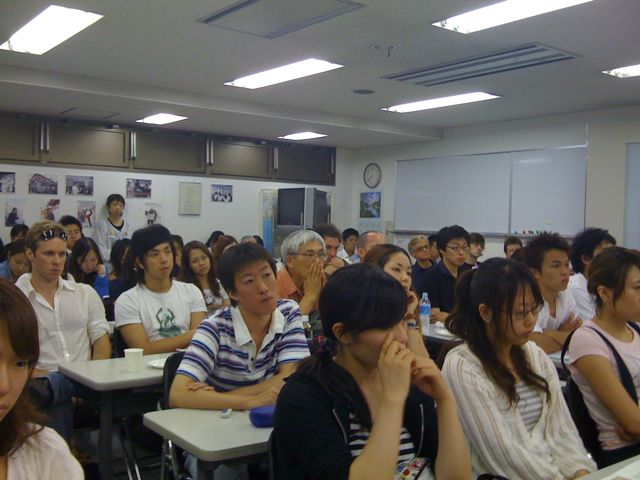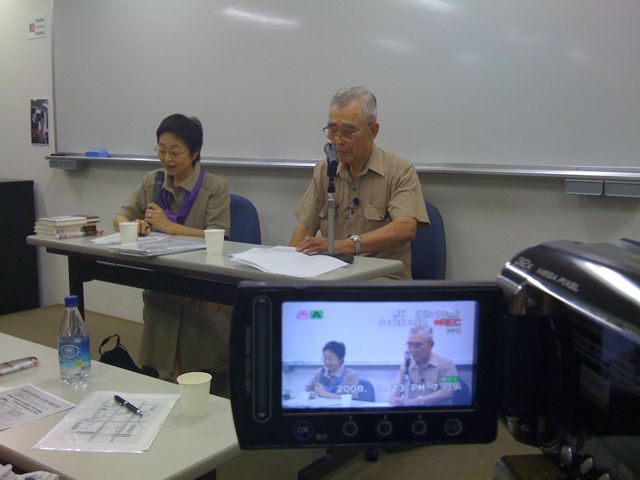Liveblogging from the Tokko Lecture
Mr. Iwai is with us right now, giving his lecture on his experiences in the Tokko-tai, the suicide squadrons in WWII. Mr. Iwai was an officer in this squadron who trained others to use manned torpedoes and diving suits to attck Allied vessels.
Mr. Iwai is 88 years of age, and full of energy. He has begun by explaining the weapons used,such as the torpedoes used by the pilots.
We have a full house tonight, perhaps 70-80 people.
Mr. Iwai himself was not one of the suicide pilots himself, but he trained and traveled with the pilots. Health problems and supply of boats prevented him from operating as one of the pilots. While he was training to perform himself, he was transferred out of the squadron.
Mr. Iwai then transferred into a new unit, one that used little more than primitive diving suits with mines attached to bamboo poles.
After practicing this technique, Mr. Iwai came to feel that this way of attacking vessels would be worthless. The suits made it impossible to look upwards, as the balance of the suits forced the wearers to lean forward and look down. Nevertheless, as officers in the Imperial Navy, they were expected to perform even if the orders were foolish.
Because of flaws in the suit design, sometimes a corrosive liquid would flow through the air hoses and fill the helmets of the divers, burning their faces and throats, killing them. Mr. Iwai says that about fifty young men died in this way, though records of these events were burned after the end of the war.
He ends with a message that Japan was committing a kind of crime against it’s own people, reminding us strongly of what nations to to their own in times of war. His intention here tonight primarily, however, is to let the young students here understand that these acts are not to be seen as an example to follow, but as terrible acts forced upon the soldiers, in an unjustified war. While the acts of sacrifice made by the soldiers was in itself beautiful and much worthy of respect, the war itself was wrong and should never have taken place.




I visited a buddy from college on a business trip to California about 8 years after I graduated from college. We went out cruising the local hang outs with a couple of buddies from school. One of them was a guy who’s father was a professor who had immigrated from Taiwan.
During the war, he was drafted into the Japanese army. Near the end the conditions were miserable. The Japanese were then looking for volunteers to become hari kari suicide attackers. His father saw that the volunteers were given much better conditions and food. So he volunteered. He said he was trained to operate a submarine. When the time came for him to go on his mission, he came down with dissentary (phonetic) and was hospitalized. By the time he got out of the hospital the war was over. He went on to become a college professor at a major American university, and somewhere in southern California he has a child and maybe grand children running around leading normal productive lives.
yeah, very interesting lecture, I was there too and listened to the stories of Mr Iwai… what i recognized was that the q&a round kind of focused on the topic of 愛国…
I also forgot to sign up for the book, which was only 150yen 😉
thanks again for the heads up.
I wonder what percentage of these people disappeared when they got close to doing their trick?